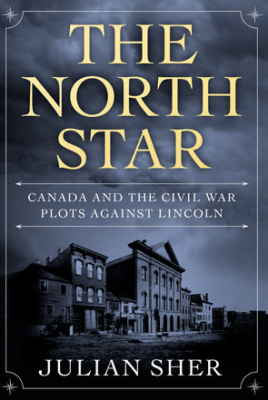Books about the assassination of Abraham Lincoln number in the thousands, but Julian Sher’s The North Star: Canada and the Civil War Plots Against Lincoln is one of very few to emphasize how these plans were hashed out over mint juleps and oysters at hotel bars in Montreal and Toronto. Though modern Canadians have conveniently forgotten it, contemporary observers knew well that Canada’s elites had picked a side in the Civil War, and they’d gone with the slaveholders of the South. Though a handful of ordinary Canadians did, indeed, support the efforts of the Underground Railroad, elites in Montreal, Toronto, and elsewhere were propping up the slave system that necessitated the Underground Railroad in the first place.
In one Montreal hotel alone – St. Lawrence Hall, which closed in 1902 – a whole host of Confederate sympathizers, spies, and secret service men met to play billiards and hatch plans. Their scheming resulted in raids across the border at St. Alban’s, Vermont, in the coordinated firebombing of New York City hotels, in piracy on Lake Erie, and an unscientific attempt at biological warfare when trunks of clothing infected with Yellow Fever were shipped to key Northern cities in the hopes of spreading plague and misery. These were Confederate fighters, but none were soldiers. Instead, they were in the official (and unofficial) employ of Confederate leaders desperate to outflank the Union armies who, by the middle of the war, were winning.
The North Star Penguin Random House
Canada and the Civil War Plots Against Lincoln
Julian Sher
$38.00
cloth
480pp
9781039000292
For readers unfamiliar with this history, Sher provides the necessary framing and achieves a fair degree of nuance, too. As someone unfamiliar with this period, I was surprised to find out that though Lincoln always felt personally appalled by the institution of slavery, he did not wage war against the South for the sake of the slaves, but rather for the sake of the Union, writing:
If I could save the Union without freeing any slave I would do it, and if I could save it by freeing all the slaves I would do it; and if I could save it by freeing some and leaving others alone, I would also do that.
But Confederates knew that losing the war would put an end to their slaveholding, and so Lincoln was enemy number one. In Sher’s telling, we get memorable details – like that earlier efforts to off Lincoln involved “poisoned ink” and “a spider-filled dumpling” – and rich characterization. The tone befits the telling too: it’s sometimes lofty, sometimes wry, though I wondered if Sher didn’t stray too far into James Bond territory when, for instance, the beauty of the one female Confederate spy, Sarah Slater, was emphasized too frequently for my taste. I wondered, too, if, in the hands of a different writer, the narrative about cross-dressing Emma Edwards might have been less spirited and fanciful, and more curious about the possibility that this person might have felt more truly themselves as a man, a thought Sher never entertains.
These are minor concerns, though, because the wider project Sher has undertaken here is, indeed, an important corrective to the history Canadians have clung to for too long. One question that remained for me throughout the book was what exactly prompted most well-heeled Canadians to support the South. Though Sher often paints rich portraits of the estates and grandeur of these dandies to the North, we hear too little about what motivated them beyond shared class interests. Were they reliant on Southern crops like cotton, and thereby invested in the slavocracy? Among a host of newspapermen, hoteliers, judges, businessmen, and priests, only the editor of Toronto’s Globe stands out as being on the right side of history – and he, unlike Lincoln, made it known from the start that disgust with the evil of human bondage was why he stood with the North.
Alas, as history has shown, winning the war did little to end the exploitation of Black people in the U.S. and elsewhere, and, in Montreal at least, support for the Confederate cause persisted until very recently when, in 2017, a plaque celebrating the sojourn of the Confederate president in Montreal was removed from the western wall of the Hudson’s Bay Company in downtown Montreal. As for the Confederate graves in Mount Royal Cemetery, they are still there, if you can find them. mRb






0 Comments